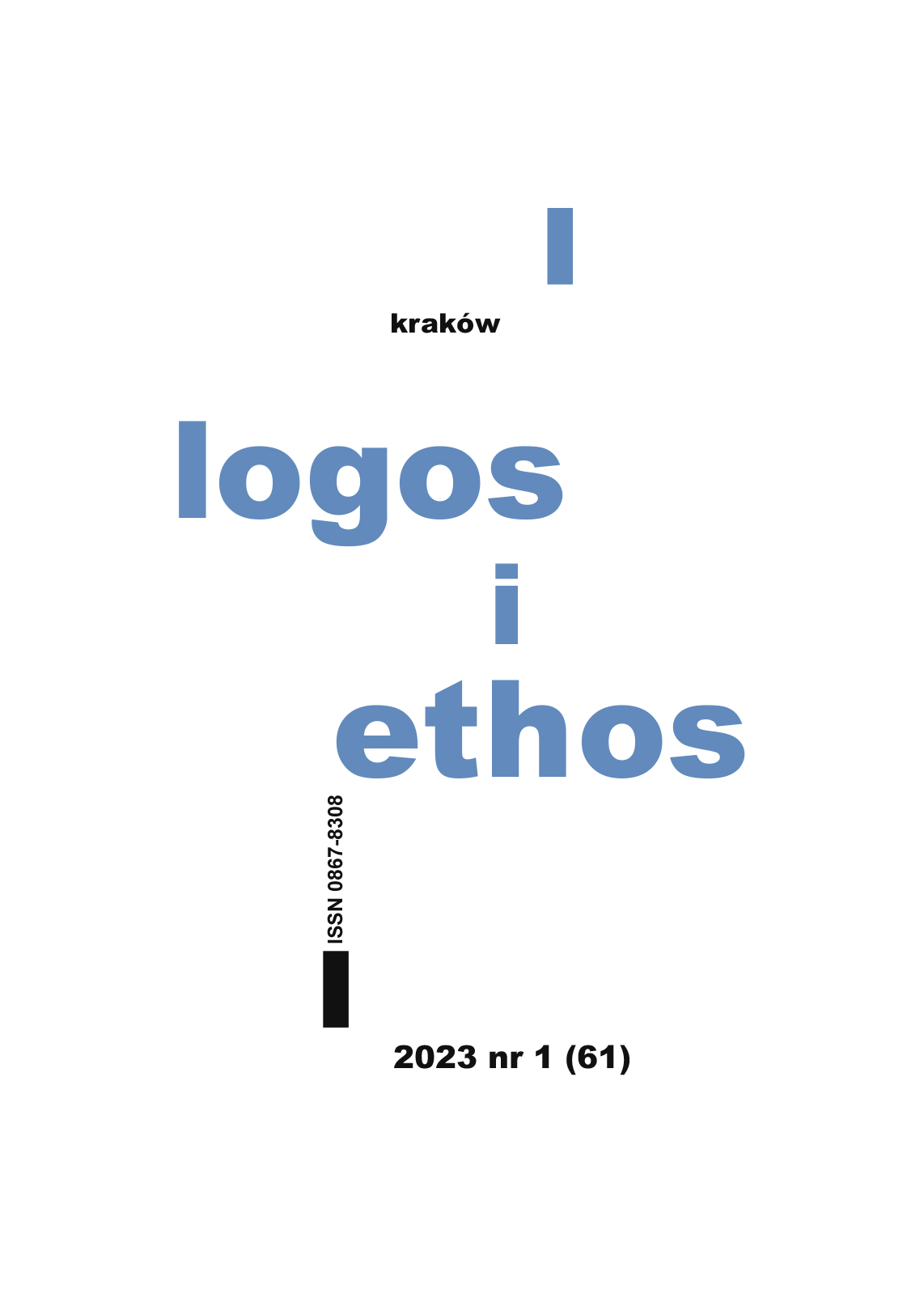The problem of personalism in Karol Wojtyła’s debate with Max Scheler
DOI:
https://doi.org/10.15633/lie.61105Keywords:
ethics, Karol Wojtyła, Max Scheler, personalism, human person, objectivism, principle of realism, postmodernism, neuroethicsAbstract
The article shows that already in his habilitation dissertation on Max Scheler’s ethics Karol Wojtyła defended the consistent ethical personalism, distorted by the German phenomenologist. However, the pertinent tying of moral values to the supreme, supra-instrumental value of the human person, involved its subjectivization, as a result of which Scheler’s claims to ethical objectivism are unfounded. Besides, in a completely unfounded manner he considered spontaneous emotionality as the centre of the person, thereby losing the person’s causative agency towards moral values, i.e. the central role of the human reason and free will in moral life, thus negating man’s moral responsibility for his actions. This assessment of Scheler’s ethics has relevance for discernment in contemporary posthumanist ethics, which – following Scheler’s lead – attributes the guiding role in moral life to spontaneous emotions.
References
Anscombe G. E. M., Modern Moral Philosophy, “Philosophy” 32 (1958), p. 169–194.
Aquinatis S. Thomae, Summa theologiae, cura et studio P. Caramello, Torino 1963.
Aristotle, The Nicomachean Ethics, transl. F. H. Peters, London 1906.
Bauman Z., Ciało i przemoc w obliczu ponowoczesności, Toruń 1995.
Bauman Z., Dwa szkice o moralności ponowoczesnej, Warszawa 1994.
Bauman Z., Etyka ponowoczesna, transl. J. Bauman, J. Tokarska-Bakir, Warszawa 1996.
Bauman Z., Moralne obowiązki, etyczne zasady, “Etyka” 27 (1994), p. 9–28.
Biesaga T., Karola Wojtyły krytyka koncepcji osoby Maxa Schelera, “Logos i Ethos” 47 (2018) nr 1, p. 181–197.
Churchland P. S., Moralność mózgu, transl. M. Hohol, N. Marek, Kraków 2013.
Czachorowski M., Mitologizacja moralności w posthumanistycznej etyce, “Człowiek w Kulturze” 32 (2022) part 1, p. 89–117.
Czachorowski M., Osoba a natura. Ujęcie Karola Wojtyły, in: Wokół antropologii Karola Wojtyły, eds. A. Maryniarczyk, P. Sulenta, T. Duma, Lublin 2016, p. 307–352.
Czachorowski M., Ponowoczesność jako moralny rozwój?, in: Społeczno-humanistyczna wizja współczesnego świata, ed. H. Czakowska, Bydgoszcz 2020, p. 11–25.
Gilson E., The Unity of Philosophical Experience, New York 1950.
Harari Y. N., Homo Deus. A Brief History of Tomorrow, London 2017.
Hołub G., Od antropologii do etyki postmodernistycznej: w stronę autentyczności czy dowolności?, in: W labiryncie wychowania. Wyzwania edukacyjne w ujęciu interdyscyplinarnym, eds. B. Stańkowski, M. Szpringer, Kraków 2013, p. 29–44.
Ingarden R., Wykłady z etyki, Warszawa 1989.
Pietrzykowski T., Etyczne problemy prawa, Katowice 2005.
Rorty R., Etyka bez powszechnych powinności, “Etyka” (1998) nr 31, p. 9–25.
Rorty R., Etyka zasad a etyka wrażliwości, “Teksty Drugie” (2002) 1–2, p. 51–63.
Scheler M., Der Formalismus in der Ethik und die Materiale Wertethik. Neuer Versuch der der Grundlegung eines ethischen Personalismus, Halle 1921.
Styczeń T., ABC etyki, Lublin 1981.
Waldstein M., Three Kinds of Personalism: Kant, Scheler and John Paul II, “Forum Teologiczne” 10 (2009), p. 151–171.
Wierzbicki A. M., Osoba i moralność. Personalizm w etyce Karola Wojtyły i Tadeusza Stycznia, Lublin 2021.
Wojtyła K., Człowiek w polu odpowiedzialności, Lublin–Rzym 1991.
Wojtyła K., Miłość i odpowiedzialność, Lublin 1986.
Wojtyła K., Ocena możliwości zbudowania etyki chrześcijańskiej przy założeniach systemu Maxa Schelera, Lublin 1959, reprinted in: K. Wojtyła, Zagadnienie podmiotu moralności, Lublin 1991, p. 11–128 (Człowiek i Moralność, 2).
Wojtyła K., Osoba i czyn, Kraków 1985.
Wojtyła K., Personalizm tomistyczny, in: K. Wojtyła. Aby Chrystus się nami posługiwał, Kraków 1979, p. 430–441.
Wojtyła K., Problem teorii moralności, ed. B. Bejze, Warszawa 1969, p. 217–249 (W Nurcie Zagadnień Posoborowych, 3).
Wojtyła K., System etyczny Maxa Schelera jako środek do opracowania etyki chrześcijańskiej, in: K. Wojtyła, Zagadnienie podmiotu moralności, Lublin 1991, p. 129–180 (Człowiek i Moralność, 2).
Woroniecki J., Katolicka etyka wychowawcza, t. 1–2, Lublin 1986.
Downloads
Published
Issue
Section
License

This work is licensed under a Creative Commons Attribution 4.0 International License.
The following rules apply to copyright:
1. The author declares that he or she has full copyright to the work, and such copyright it is not limited to the extent applicable to this declaration, that the article is an original work and that it does not infringe any third-party rights.
2. The author agrees to a free-of-charge, non-exclusive and non-restricted use of the work by Pontifical University of John Paul II in Krakow i.e.:
- to record and duplicate: make copies of the work by means of printing, reprography, magnetic or digital storage;
- to circulate the original or the copies of the work (disseminate, lend or lease the original or copies thereof, publicly display, screen or make the work publicly available so that everyone is able to access it at the time and in place they wish to do so);
- to include the work in a compilation;
- the Pontifical University of John Paul II in Krakow may grant sublicenses Creative Commons Acknowledgement of authorship-Non-commercial use-Without derivative work 3.0 Poland
- the author and the title of the work will be listed,
- the place of publication (name of the periodical and an Internet link to the originally published work),
- the work will be distributed in a non-commercial way,
- no derivative works will be created.
The UPJPII Press does not waive any of its copyrights to any target group.
If you want to publish the text in Logos and Ethos, you must sign the license. However, the signing takes place at a later stage of publishing. Check the license: [license_en.pdf]

